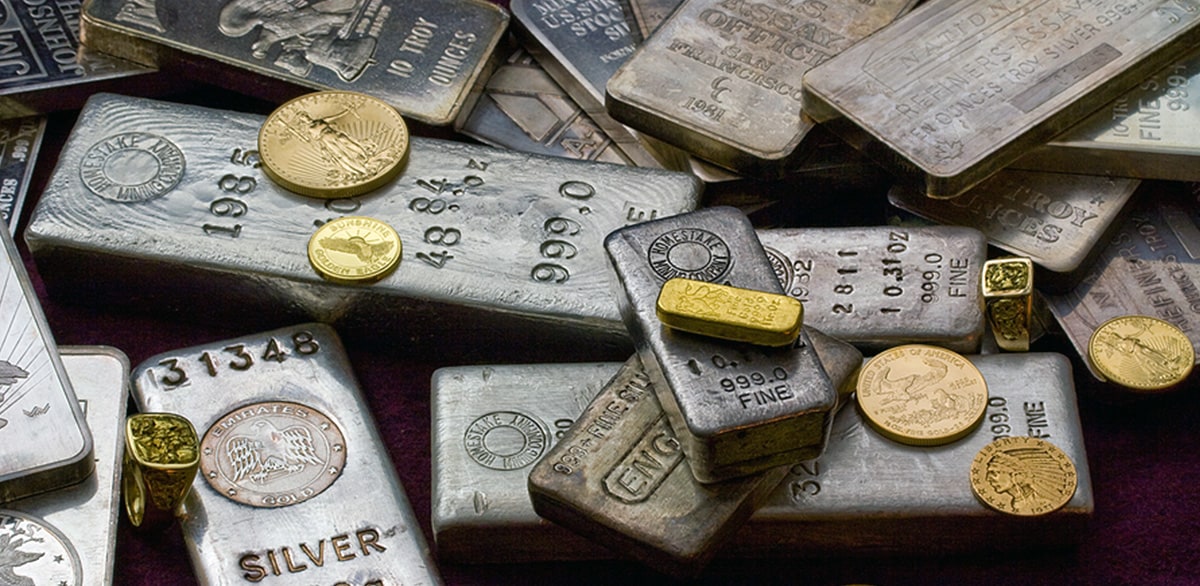
Click here to get this article in PDF

It’s not uncommon for people to bequeath precious metals in a variety of forms to their loved ones upon their passing. Liquidating these precious metals assets can leave beneficiaries with a significant cash value. However, this inheritance brings with it a litany of questions regarding the true contents of the metals, their resale value, and the relevant tax implications. Getting the highest value for your inherited precious metals requires an answer to these crucial questions.
1. What you should do (and not do) right away.
Inheriting precious metals of any kind is an equally exciting and confusing experience, especially for individuals with no prior experience with valuable metals. Here are some first steps beneficiaries should take and some to avoid when initially coming into ownership of precious metals.
DON’T RUSH: Take your time in the selling process.
Too many people rush to sell their inherited precious metals as quickly as possible, usually at rates far below their true value. Resist the urge to convert your newly acquired assets if your financial circumstances permit it. The more patience you have and the more research you can conduct, the better chances you’ll have at getting the most out of the inheritance.
Put the precious metals in a safe location.
Just like any other valuable asset, precious metals need to be protected against theft, damage, and other potential hazards. If you’ve come into a small amount of gold or silver coins, it might be possible to store them at home. However, large collections of precious metals sometimes need to get stored at a secure facility.
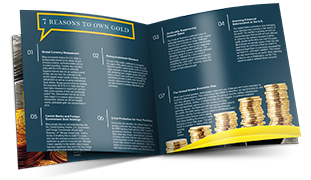
Learn How to Avoid Costly Rookie Mistakes & Invest in Gold Like a Pro!
Get Free Gold Investor Guide
Don’t sell coins or bars to a “cash for gold” buyer.
Most people are familiar with the “cash for gold” or “we buy gold” businesses that offer to buy any precious metals asset for cash on the spot. The convenience and speed of these transactions are compelling, but these gold buyers tend prey upon the inexperienced and naive. If you want to get the most for your inherited coins or bars, avoid these buyers like the plague.
Don’t clean the precious metals.
You might notice some blemishes, discoloration, or other imperfections on inherited precious metals, especially rare coins. It’s uncommon for these assets to remain in perfect condition. Attempting to clean a precious metals product in any manner could drastically reduce its value. As long as you have your inherited assets in storage, you shouldn’t worry about their condition.
Learn more about why you shouldn’t clean old coins by reading “Should You Clean Old Coins?”
2. Understand what kind of precious metals you’ve inherited.
Jewelry, Silverware, Scrap/Mined Metals
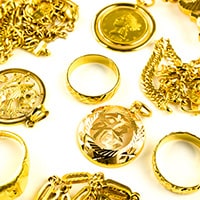
Precious metals don’t always come in the form of coins or bullion bars. If you’ve inherited scrap or mined metals, silverware, jewelry, or other atypical forms of precious metals, you might have more value than you think. For a quick DIY estimate, you can use an online tool such as GoldCalc.com. Local and reputable jewelry shops, refineries, auction houses, or pawn shops can give you a more accurate estimate if you’re looking to sell.
Hobby Coins or Country Currencies
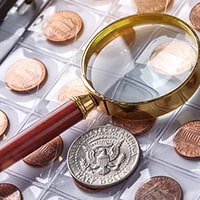
If you’ve inherited pennies, nickels, and similar hobby coins or currencies from foreign countries, you can use specialized websites or books to determine their value. There are plenty of free web and print resources that might give you a ballpark estimate. For a real-world evaluation, take the coins to a local and reputable coin shop or auction house. Make sure to consider a few offers before making your decision.
Web Resources:
- PCGS CoinFacts
- USA Coin Book
Print Resources:
- A Guide Book of United States Coins (The Official Red Book)
Graded Coins
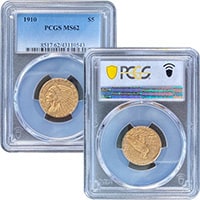
Graded coins make it a little easier for beneficiaries to determine their value as they’ve already received a professional evaluation. If you’re able to locate an invoice, call the company to see if they offer a buyback offer. You can also search the barcode or certification number on NGC or PCGS to get an updated evaluation. If you’re interested in selling, reach out to a reputable precious metals dealer like Scottsdale Bullion & Coin to give a free and accurate appraisal.
Bullion Coins & Bars
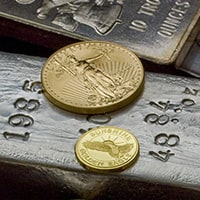
Just like with graded coins, the easiest way to determine the value of bullion coins, gold bars, or silver bars, is to find accompanying invoices. Call the original company to see if they have a buyback policy as this could help you get a higher offer than from another company. Most bullion products are stamped with denomination and fineness information which is key to determining their value. You can use a spot pricing chart to get an estimate of their value, but know, you may not find a coin dealer or shop willing to pay you the spot price for your bullion. If you want an accurate evaluation, find a reputable precious metals dealer like Scottsdale Bullion & Coin for a free appraisal.
Stocks

When people think of precious metals, they often envision physical products such as gold and silver coins or bullion bars. In addition, there are a variety of stocks that track the spot prices of precious metals. If you inherit these paper metals, as they’re called in the industry, you can sell and trade them like any other stock. All you have to do is access the account or speak with the brokerage managing the account to determine the value of your inherited precious metals stocks.
Physical Precious Metals IRA
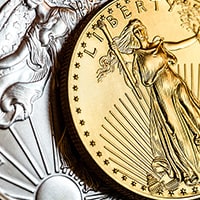
It’s not uncommon for people to inherit an individual retirement account (IRA) from a loved one. A precious metals IRA has the same legal structure, but it allows owners to invest in gold and silver coins and bars. Similar to inherited precious metals stocks, all you have to do is contact the IRA custodian or precious metals firm that the IRA was set up with, to determine the overall value of your inherited account or simply sign in if you have access.
3. Consider shopping around for the best offer.
As mentioned before, it’s perfectly natural to look for the quickest method of liquidation after inheriting precious metals. More often than not, this rash decision-making leads heirs to accept prices far beneath the true value of their inheritance. Instead of rushing into a sale, consider shopping around to see what different buyers are willing to pay. You can start by consulting with local coin dealers in your area before moving on to reputable coin dealers across the country. Before working with a potential buyer, make sure they have a safe and secure process for appraisal and purchase.
Get a cash offer for your inherited precious metals from Scottsdale Bullion & Coin. We provide a free appraisal with an accurate and fair cash offer.
4. Know the tax implications.
Many people incorrectly assume that inheritances aren’t subject to taxes. In reality, the federal government might levy taxes on inherited precious metals above specific dollar amounts. Some state governments could have their own tax rules too. Since each asset class may differ in tax implications, it’s important for heirs to consult with a relevant tax professional to better understand the nuances of varying types of precious metals, their distinct asset classes, and relevant taxes.
5. Consider your options after inheriting precious metals.
You have a few options to consider after inheriting precious metals. Understanding each of these possibilities and their advantages and downsides can make it easier to determine which is best based on your unique situation.
Hold onto the precious metals investment.
With various options to consider, it’s easy to forget that you can hold onto your inherited precious metals. We highly advise beneficiaries to get an accurate appraisal of their inherited assets so they have all the information needed to make an educated decision. However, there’s nothing wrong with holding onto the precious metals for the future. You can always make a decision later down the line.
Transfer the inheritance to other forms of precious metals.
Even if you’re interested in holding precious metals assets, the inheritance might not meet your diversity requirements or investment strategy. In these cases, you can swap out the inherited assets for something that better matches your goals. Through a reputable precious metals dealer, you’ll have a lot of precious metal types to choose from such as gold, silver, platinum, and palladium in the form of bullion coins and bars or numismatic coins.
Liquidate the precious metals for cash.
If you’re in immediate need of some cash or simply have no desire to hold onto the assets, you can sell the inheritance right away. Just make sure you use a reputable, experienced, and qualified buyer that will give you top-dollar for the precious metals. The obvious downside to this course of action is you lose out on any potential value growth down the road.
Interested in selling your gold and silver inheritance? Get a fair and free cash offer from the experts at Scottsdale Bullion & Coin.
Precious Metals Inheritance FAQs
What happens if you inherit gold?
It’s completely up to you. You can hold onto the gold, liquidate the precious metals for cash, or transfer it into another asset class. The best choice depends on your current needs and long-term investment goals. It’s a good idea to speak with a knowledgeable precious metals dealer to figure out the best move.
Do I have to pay taxes on inherited silver?
You don’t have to pay taxes on inherited precious metals if they’re gifted by a blood relative and you decide to hold onto them. However, you’re liable for taxes if you sell the inherited precious metal assets.
What do I do with inherited gold coins?
One of the first things you should do after inheriting gold coins is to get them appraised by reputable precious metals dealer. On top of the inherent value of their gold contents, coins could also carry numismatic value. Once you understand the value of your inherited gold coins, you can decide to hold onto them, sell them, or transfer them into another asset class.
Is inherited jewelry taxable?
Jewelry is treated the same as other precious metal assets when inherited. You don’t have to pay any taxes until you decide to sell them.
How do I sell my inherited gold?
The best way to sell inherited gold is to work with a reputable, knowledgeable, and experienced precious metal dealer like Scottsdale Bullion & Coin. Try your best to avoid “cash for gold” businesses.
How do you prove gold is inherited?
If you need to prove precious metal assets have been inherited, you can use original invoices from the purchase or a copy of the will or gift deed outlining the bequeathment.